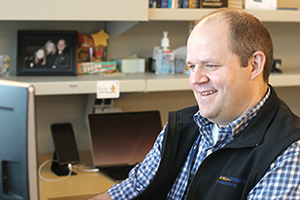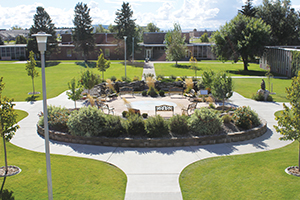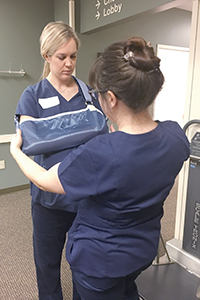By DALE SINGER
Providence St. Joseph Health has an innovative way to make sure it has the people it needs to fill the unrelenting demand for trained workers in a variety of professions: it's growing its own at its own university.

Mitch Hartly is taking advantage of the University of Providence's distance learning capabilities and employment-based tuition incentives from Providence St. Joseph Health to pursue a master's degree in health care administration. He is a manager for care management with the Portland Medical Group in Portland, Ore.
Eric Taylor/Providence St. Joseph Health
Last summer the system rebranded the University of Great Falls in Montana as the University of Providence and created a School of Health Professions. And plans are afoot to add or enhance at least 13 undergraduate and graduate programs in clinical, administrative and Catholic mission-related fields within 18 months. The goal is to build a pipeline for employment at, or advancement within, Providence St. Joseph Health. The programs include a residential campus, satellite campus and distance learning opportunities, or some combination of these.
The small, private Catholic liberal arts school was co-founded as a junior college in 1932 by the Sisters of Charity of Providence. Their intent was to train educators to teach Native Americans. It evolved to be a teaching college and a university. The congregation also developed and grew sponsored works in health care; the university and a Burbank, Calif., high school started by the congregation are part of Providence Health & Services and its parent company, Providence St. Joseph Health.
Distance learning pioneer
Montana's deep, drifting snows make rural roads impassable for weeks, and so the college embraced distance learning as early as World War II. Well before the advent of the Internet and interactive video, students got lesson assignments in the mail or by telephone. The university's distance learning capability evolved along with technology — and that holds great appeal for Providence St. Joseph Health. It allows employees throughout the seven-state system to continue in their jobs while taking classes online and completing field work at Providence St. Joseph Health clinical care facilities close to their homes.

The University of Providence in Great Falls, Mont., is part of Providence St. Joseph Health. The health system is leveraging that relationship to build a professional workforce now and in the future.
For almost a decade the university has run a RN to BSN program enabling registered nurses with associate degrees to earn Bachelor of Science in nursing degrees. About two years ago the university added master's degree programs in health care administration, epidemiology and infection prevention, as well as a certificate program in clinical informatics. About a year and a half ago, around the time Providence Health & Services joined with St. Joseph Health to form Providence St. Joseph, efforts to leverage the university as an employment pipeline for Providence St. Joseph really started to accelerate.
Dr. Rod Hochman, president and chief executive of Providence St. Joseph, visited and toured the Montana campus with Deborah Burton, the health system's chief nursing officer. Burton says Hochman told her, "this is an asset we really need to invest in."
Dynamic planning
Providence St. Joseph's workforce of more than 110,000 includes almost 40,000 nurses. Burton knows well how difficult it is to fill health care jobs. The greatest challenge is in filling jobs for registered nurses, surgical technologists, medical assistants and nurse practitioners, she says. Building on synergies between Providence St. Joseph's clinical and education ministries, she helped launch the School of Health Professions at the University of Providence last summer, and became its first vice president. Its growing list of programs is expected to reach as many as 10,000 students within 10 years.

Burton
Burton says the School of Health Professions will field most of the master's programs the university plans to add in the near term, and it is moving toward offering doctoral programs. In addition to the health professions programming, the university is enhancing course offerings in its School of Liberal Arts and Sciences. Both schools will focus on job placement within Providence St. Joseph, and improve access to affordable academic opportunities for employees and their dependents, says the health system.
The approach gives Providence St. Joseph the flexibility to fund and grow programs in subject areas and markets where it has the greatest need for specialized staff. And Burton says the health system can enhance education subsidies to incentivize employees and other students to enter fields where the demand is highest.
"We developed a prioritization and funding rubric based on the business case that takes into account difficult-to-fill positions and the costs to fill them, forecasted retirements, future growth and new models of care, and competitive realities in the marketplace," she says.
Providence St. Joseph offers tuition discounts for current employees and their dependents as a benefit of employment. For nonemployees it can shape educational financial support such as tuition subsidies and tuition forgiveness programs to encourage future employment at Providence St. Joseph ministries.
Burton says the financial support is vital to success in workforce planning, "but it's not always easy to figure out the right mix of incentive programs, reflecting our relative needs and demand. Each program will be handled a little differently," she says. Pilot programs throughout the system help refine each new program.
Help wanted: nurses, surgical techs
Much of the early focus of programming is on training nurses. Burton says Providence St. Joseph faces a "tsunami" of nurse retirements over the next five to 10 years. "Over the next 10 years we will need to hire fourfold what we have to hire now," she says. "We could not even meet our forecasted demand if we hired every graduate of every nursing BSN program in the seven states where we do business."

As part of their distance-learning curriculum in a University of Providence medical assistant certificate program, Amber “Rose” Hall adjusts a sling for her “patient,” fellow student Stephanie Tobias. The women are participating in a skills lab held at the Providence Medical Group’s primary care clinic in Wilsonville, Ore. Because Tobias is employed by Providence St. Joseph and Hall’s mother works for the system, both women receive reduced tuition.
In U.S. nursing schools, the number of student slots long has been limited by the shortage of nursing faculty and by limited access to clinical training sites. The Providence St. Joseph model addresses these hurdles by signing on staff nurses with advanced degrees as adjunct faculty, to help teach and precept University of Providence students during their clinical practice at the system's facilities.
And, as noted, nursing isn't the only clinical field facing labor shortages. "The number of days it takes to fill any position is growing daily," says Burton, who also is a senior vice president at Providence St. Joseph. "The highest need we have for clinicians today is for surgical technologists," she says. The university has a surgical technologist program approved to launch this year, starting in Washington state. It also intends to prepare students for careers in nonclinical professions of established need: mission directors, hospital chaplains and end-of-life-counselors.
Learning leadership, grit
The tuition subsidies and online learning option have been a boon to Mitch Hartly. He is manager for care management with the Providence Medical Group in Portland, Ore., and graduated two years ago from the university's RN-BSN program. Without those incentives, Hartly says, "I probably would have stayed an associate degree nurse and would have stayed in just a supervisory position in home services.
"I thought, 'What a fantastic opportunity to go in there at reduced cost,'" he says. "I felt like I really learned a lot and the experience prepared me for leadership positions." Hartly continues his education and will graduate in August with a master's degree in health care administration from the University of Providence. He is on the university's Nursing Advisory Board, which he says makes him feel like he is a part of the school's transformation.
With a family, a job and school, at times Hartly isn't sure he can make it past what he calls "mental roadblocks" to completion. But, he says, the university is there to help.
"There are weeks where it's felt like it's going to break me," he admits, "and there have been weeks that I've been more comfortable" with the workload.
"I was told I should get comfortable being uncomfortable. That stuck with me. When I'm looking at all the assignments I have to do and work I have to do and all my other responsibilities in life, I know that I'm going to get through this time and learn lessons from this and get stronger and be able to handle things better," he says.
|
University of Providence School of Health Professions
The University of Providence, part of Providence St. Joseph Health, launched a School of Health Professions in July of 2017 clustering existing undergraduate and graduate programs and laying the groundwork for a broad expansion of academic offerings on the Great Falls, Mont., campus, at satellite locations and online. School of Health Professions programs are being designed specifically for Providence St. Joseph Health's caregivers, based on dynamic labor needs of the health system.
Current offerings in the School of Health Professions, all of which are structured for distance learning with clinical components in Providence St. Joseph Health facilities, are as follows:
- RN to bachelor of science in nursing degree completion program
- Master of health care administration
- Master of science in epidemiology and infection prevention
- Certificate program in clinical informatics
- Medical assistant certificate (currently available only in Oregon, with plans to expand it to health system markets based on greatest needs)
Priority programs in the queue for development in the next 18 months are:
- Surgical technologist
- Medical assistant
- Master of science in nursing
- Second degree BSN (an accelerated nursing degree for students who hold a baccalaureate in another field)
- BSN degree path for high school graduates
- Nurse practitioner (master's degree)
- Executive MHA (additional track added to existing post baccalaureate, basic MHA)
- Medical technologist
Programs which may be offered through, or in collaboration with, the university's School of Liberal Arts and Sciences are:
- Bachelor degree in data scientist, health care focus; followed by master degree program
- Masters in theology, hospital chaplain track
- Masters in theology, mission director track
- Masters in counseling with end-of-life and grief counseling focus
- Music thanatologist
|
Copyright © 2018 by the Catholic Health Association
of the United States
For reprint permission, contact Betty Crosby or call (314) 253-3490.